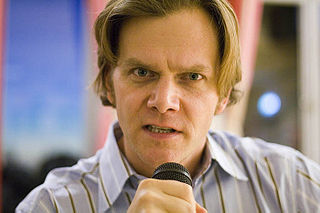A Quote by Sarah Kay
The first spoken word poem I ever wrote was when I was 14 and I wrote it because I was accidentally signed up for a teen poetry slam. Because I loved poetry I said that I'd try it out.
Related Quotes
That's one of those questions that would just love to have a pat answer. You know, poetry's job is to make us feel good. Poetry exists to allow us to express our innermost feelings. There isn't one role for poetry in society. There are many roles for poetry. I wrote a poem to seduce my wife. I wrote a poem when I asked her to marry me. Poetry got me laid. Poetry got me married.
What I wrote all the time when I was a kid - I don't want to call it 'poetry,' because it wasn't poetry. I was not that kind of a writer. I was a rhymer. I was a fan of Dorothy Parker's, so maybe I wrote poetry to that extent, but my main focus was the humor of it, and word construction, and the slant. Your words, it's a very powerful experience.
My first spoken word poem, packed with all the wisdom of a 14-year-old, was about the injustice of being seen as unfeminine. The poem was very indignant, and mainly exaggerated, but the only spoken word poetry that I had seen up until that point was mainly indignant, so I thought that that's what was expected of me.
High school was the first time I ever saw spoken word poetry. The first place I ever performed a poem was at my school, so in some ways it was the nucleus of how it all started. For me I think high school was a period of trying to figure myself out, and poetry was one of the ways I did that, and was a very helpful avenue to try to do that.
I don't know what started me, I just wrote poetry from the time was quite small. I guess I liked nursery rhymes and I guess I thought I could do the same thing. I wrote my first poem, my first published poem, when I was eight-and-a-half years old. It came out in The Boston Traveller and from then on, I suppose, I've been a bit of a professional.
I think you can perform any poem. But what I believe is that the best examples of spoken word poetry I've ever seen, are spoken word poems that, when you see them, you're aware of the fact they need to be performed. That there's something about that poem that you would not be able to understand if you were just reading it on a piece of paper.
If you've ever been to a poetry slam, you know that the highest scoring emotion is self-righteous indignation: how dare you judge me. So in that way, the poem, 'What Teachers Make,' is an absolutely formulaic slam poem designed to allow me to get up on my soap box and say, 'Let me tell you what really makes me angry.'
The first song I wrote and had published was titled "Just As Long As That Someone Is You". It was written in 1959, and recorded in 1965 by Jimmy Ellege. I started writing songs because I wanted something of my own to sing. I, at that time, was not aware that the songs I heard on the radio were not written by the folks singing them. I had always loved poetry, and found it easy to integrate a melody with poetry.
If I looked at some of these pieces as if this project was not spoken-word but just short anthology, I probably would have fussed with some of the sentences, you know? Syllabication and prosody and such crap. Because the printed word is etched in stone. But for reading purposes I accepted this book of texts in the manner in which I wrote them, no need to fuss. Most of the shorter stuff was written as poetry. Meaning lots of white space on the page.
The first time I ever performed spoken word poetry in front of a big crowd, it totally failed. It ended, people barely clapped...in retrospect the poem was terrible. And for a while I thought this was something I would never do again. And then I realized that, in my 17-year-old head, that was the worst it could have been. And it wasn't that bad - [because] from there, it could only get better. And I think that failure kind of freed me up to explore and not be afraid of failing again.
Sometimes he would advise me to read poetry, and would send me in his letters quantities of verses and whole poems, which he wrote from memory. 'Read poetry,' he wrote: 'poetry makes men better.' How often, in my later life, I realized the truth of this remark of his! Read poetry: it makes men better.
































